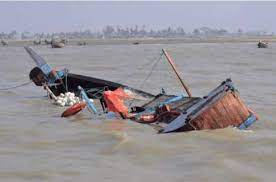A grossly overloaded boat capsized on the Volta Lake near Kete Krachi, claiming 15 lives including 11 children, prompting the Ghana Maritime Authority to launch an investigation into the tragedy.
The vessel overturned on Saturday, October 11, 2025, leaving only four survivors from what authorities described as a preventable disaster caused by severe overloading. Among the deceased were 11 children between the ages of two and 14 years, comprising five males and six females, along with four adults including three women.
The Ghana Maritime Authority expressed deep sorrow over the incident in a statement released Sunday. The Authority extended condolences to bereaved families and the Kete Krachi community, describing the loss as heartbreaking and unimaginable.
A specialized team comprising maritime inspectors and members of the Navy Task Force has been deployed to the accident site to determine the precise cause and ensure accountability. The investigation will examine vessel capacity, loading practices, safety equipment availability, and operator compliance with maritime regulations.
The GMA announced plans to establish a high level Casualty Investigations Committee in collaboration with the Ministry of Transport. This committee will recommend urgent policy and safety reforms aimed at preventing similar tragedies on Ghana’s inland waterways, particularly the Volta Lake where such incidents occur with disturbing frequency.
As part of immediate response measures, the Authority announced intensified lakeside safety enforcement operations. These efforts will focus on clamping down on overloading practices and prosecuting boat operators who flout safety regulations. The enforcement campaign aims to demonstrate that violations will no longer be tolerated.
Ghana has recorded several deadly boat accidents in recent years, with the Volta Lake emerging as a particular concern for maritime safety. Overcrowding, poor vessel maintenance, and lack of lifejackets remain persistent problems that have claimed numerous lives despite repeated warnings from authorities.
The Volta Lake, created in 1965 following the construction of the Akosombo Dam, serves as a critical transportation route for communities in the Volta basin. Inhabitants depend almost exclusively on lake transportation for social and economic activities. However, this dependency has come with tragic costs as accidents on the lake have become increasingly common over the years.
Many communities around the Volta Lake lack alternative transportation infrastructure, forcing residents to rely on boats for basic mobility. This creates pressure on available vessels, often leading to overloading as operators seek to maximize passenger numbers. Economic considerations frequently override safety concerns in decisions about vessel capacity.
The latest tragedy highlights systemic failures in enforcement of maritime safety regulations on inland waterways. Despite existing rules governing passenger capacity and safety equipment requirements, compliance remains poor. Operators often face minimal consequences for violations, creating an environment where dangerous practices persist.
The GMA urged residents and passengers to refuse boarding visibly overloaded boats or those lacking proper safety equipment. The Authority emphasized that individual refusal to board unsafe vessels could save lives, especially those of children who constitute vulnerable passengers unable to make such decisions independently.
However, this appeal places significant burden on passengers who may have limited transportation alternatives. In many lakeside communities, refusing to board an overloaded boat could mean missing essential trips for healthcare, education, or economic activities. Addressing the root causes requires improving vessel availability and enforcement, not just passenger vigilance.
Previous boat disasters on the Volta Lake have prompted similar pledges of improved safety enforcement, yet tragedies continue occurring with alarming regularity. This pattern suggests that periodic enforcement campaigns following accidents prove insufficient without sustained, systematic oversight of inland waterway operations.
The children who perished in this disaster represent a particularly tragic dimension of Ghana’s maritime safety crisis. Their deaths underscore how safety failures disproportionately affect vulnerable populations who depend on adults and authorities to ensure their protection during travel.
Weather conditions at the time of the accident remain under investigation. The Volta Lake can experience sudden changes in conditions that pose risks to small vessels, particularly when overloaded. Proper vessel capacity management becomes even more critical when weather may deteriorate during trips.
The four survivors will likely provide crucial testimony about the moments before the capsizing and the conditions aboard the vessel. Their accounts could inform the investigation’s findings regarding operator decisions, passenger warnings, and available safety equipment.
Community members around Kete Krachi are grappling with profound grief as multiple families mourn losses from a single incident. The concentrated impact on one community amplifies the tragedy’s effects, potentially affecting the area’s social fabric for years to come.
This disaster may catalyze renewed pressure for comprehensive maritime safety reforms beyond temporary enforcement surges. Civil society groups and affected communities increasingly demand systemic changes that address underlying factors driving unsafe practices on Ghana’s inland waterways.
The Ministry of Transport faces mounting expectations to demonstrate genuine commitment to preventing future tragedies. Words of condolence and investigation announcements must translate into concrete actions that transform maritime safety standards on the Volta Lake and other inland waterways.
As Ghana mourns these preventable deaths, the incident raises fundamental questions about priorities in transportation safety and resource allocation for enforcement. The answer to these questions will determine whether this tragedy becomes a turning point or another sad entry in a growing list of avoidable disasters.
Source: newsghana.com.gh











